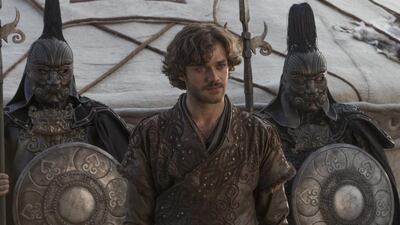It is hard to believe that barely 18 months ago, Marco Polo star Lorenzo Richelmy didn't speak a word of English.
Such was the determination of the producers to offer absolute realism in the historical epic that they took the chance of casting the little-known Italian in the role of the young Venetian merchant during his years at the court of Kublai Khan.
Richelmy had to learn the language while working on the Netflix show – which has won widespread acclaim, with the second season making its debut on Friday. Understandably, Richelmy says the experience was the biggest challenge of his career.
“It was tough,” Richelmy says. “We shot the first season chronologically, so we started with Marco Polo in Italy then the action moves to Mongolia, which is pretty much what happened to me too. From episode one to episode 10 you’ll see a big difference in my accent, which I guess is what would have happened to Marco in reality. I was scared as hell, but I want to be an actor and, I think if you want something badly enough and you have the drive, you can achieve whatever you want.”
A major part of its appeal is the attention to detail, not just in terms of its multicultural casting – the series also stars British actor Benedict Wong and veteran Chinese-American actress Joan Chen – but for the fact-based scripts.
It is the latter that Richelmy is most proud of. “We’re also hoping to school people about a period in history that [most] people know nothing about,” he says.
“We’re talking about the biggest empire in the history of the planet, and nobody knows anything about it. It’s ridiculous, and it shows how the West is so self-focused on its own history. I don’t know that we feel a responsibility to do this, but there’s certainly a pride that we’re doing it. Just to have an Italian lead in a big US show is an achievement, and we want to be really close to that eastern culture, not just a western fantasy version of it.”
Joining the cast in season two, in a yet-to-be-revealed role, is Crouching Tiger, Hidden Dragon star Michelle Yeoh.
The Chinese-Malaysian actress agrees Marco Polo has a mission to educate as well as entertain.
“There was a very interesting side to Kublai Khan that we didn’t know about. He wasn’t just a warlord who came in and destroyed everything, he kept things and he made people learn about things. There was an intellect that went behind all that,” she says.
“So the martial arts scenes aren’t just for the sake of some action. They weren’t there for a token ‘Ooh, we’re in China, let’s do some kung fu’ – they really did train very skilled fighters, because they had to protect the emperor and he needed the most skilled people around him because people would definitely try to assassinate you. I’d hope to offer a realistic version of the culture we’re representing, and they certainly do that with Maro Polo. Of course there are some liberties taken for the sake of the story, but if you don’t have a solid base in fact how can you tell that story?”
The approach has won some friends in high places. Last year, the Mongolian president Tsakhiagiin Elbegdorj presented the series creator John Fusco and the Marco Polo creative team with an award, honouring their positive portrayal and the global presentation of the subject matter.
With a first-season budget reportedly to be around US$90 million (Dh330m), Marco Polo is the second most-expensive television production ever made, after Game of Thrones. Richelmy promises things are only going to get bigger in season two. "We're going to add to it. The show will become more complete. Obviously the sets and so on are already built, but we can add in other areas, we can build on it emotionally," he says.
“You’re going to experience the dark side of each of the main characters in season two. That’s as much as I can give away right now scriptwise, but I promise you it’s going to get really dark.”
• Marco Polo season two will be streamed on Netflix from Friday. For details, visit www.netflix.com
cnewbould@thenational.ae

